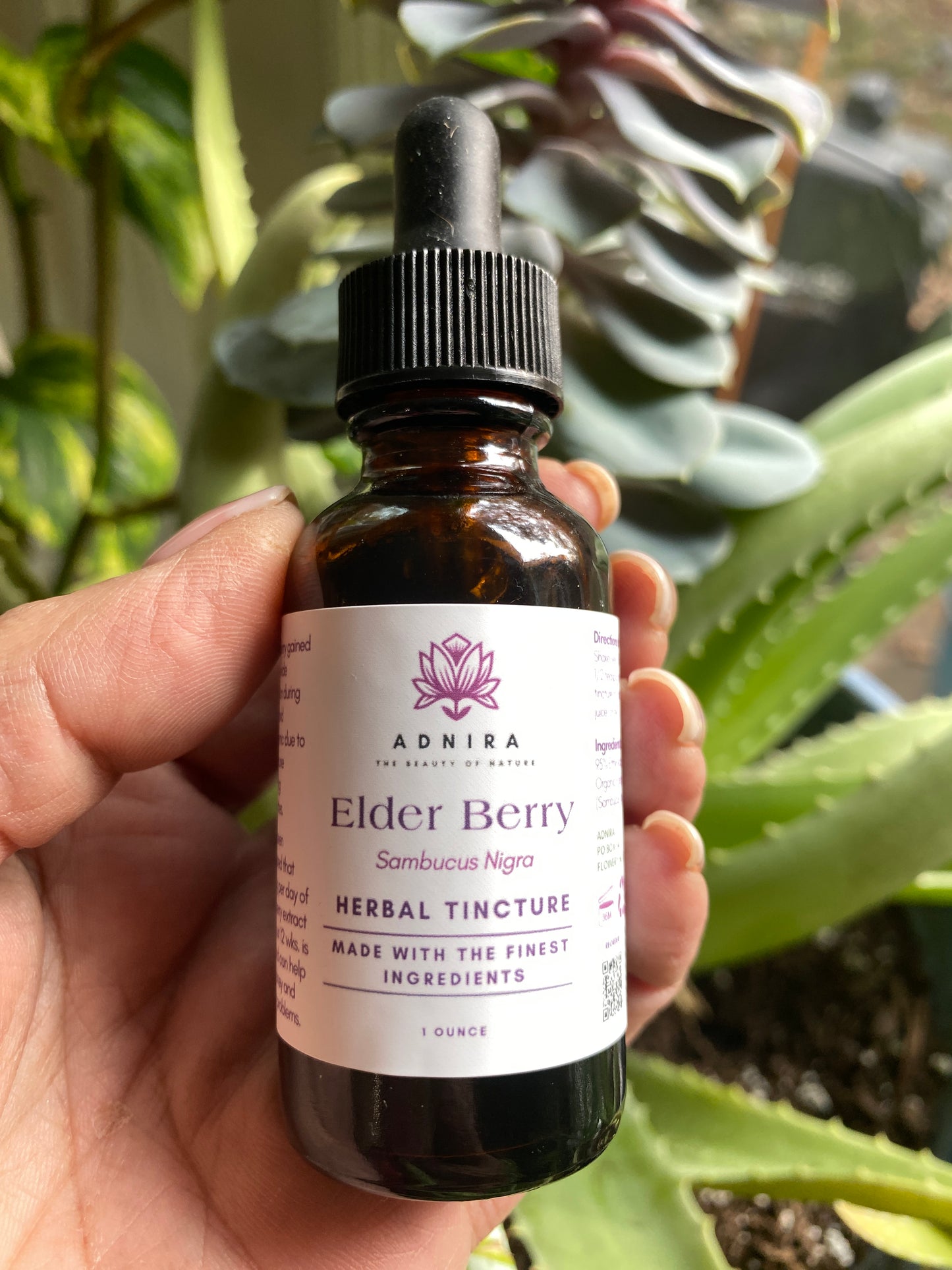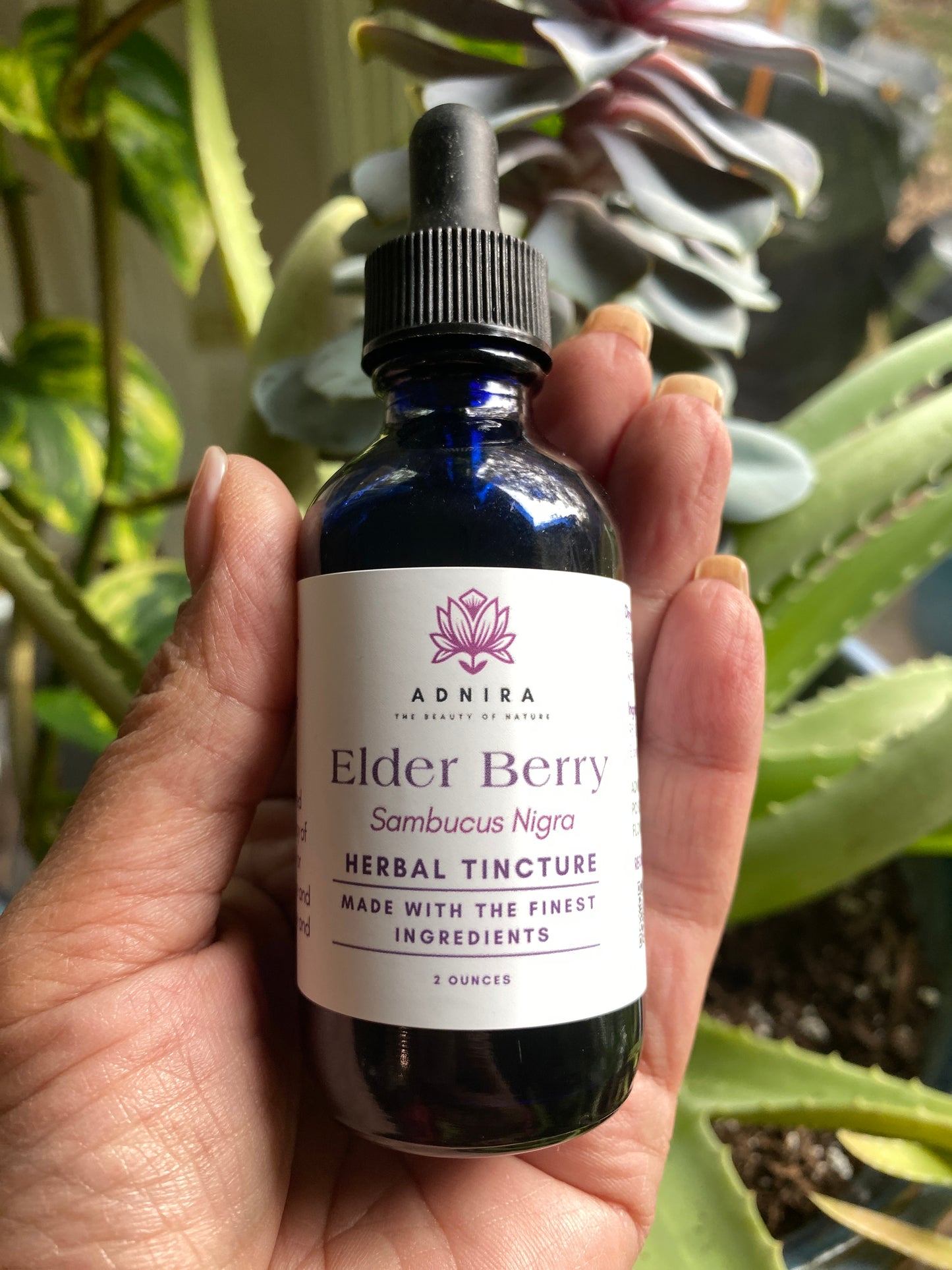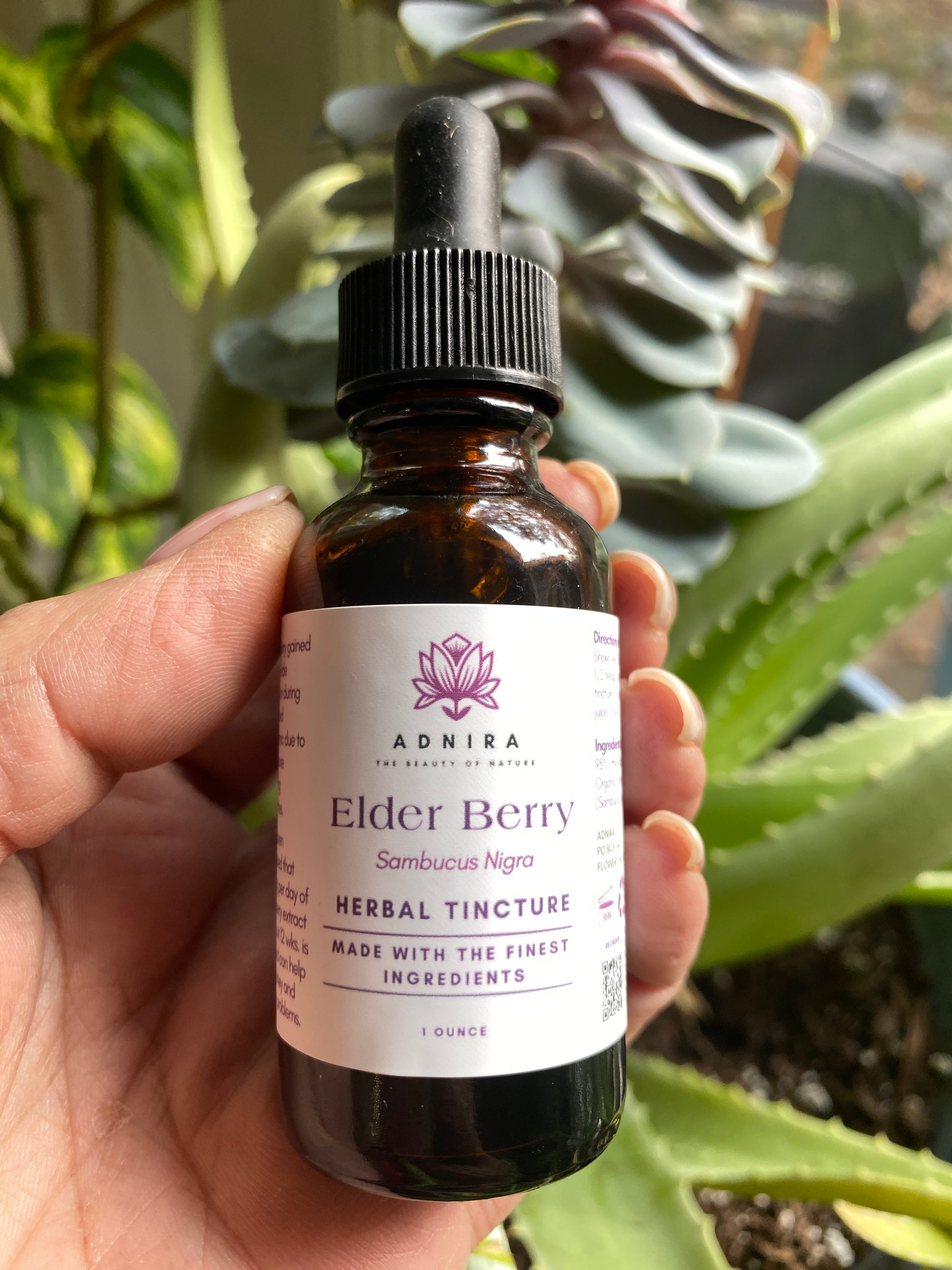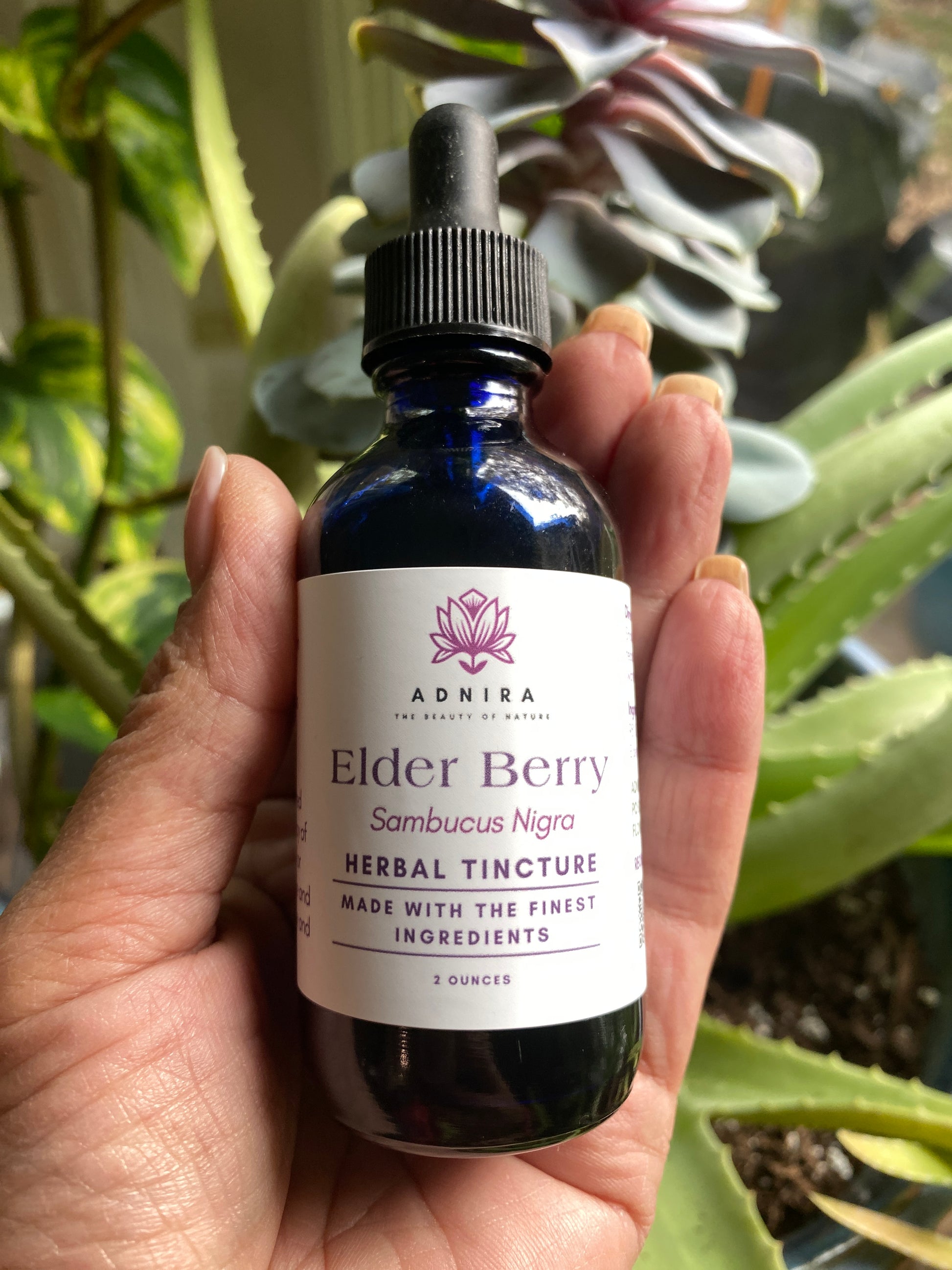1
/
of
2
Adnira
Elder Berry Alcohol Tincture
Elder Berry Alcohol Tincture
No reviews
Regular price
$19.00 USD
Regular price
Sale price
$19.00 USD
Shipping calculated at checkout.
Quantity
Couldn't load pickup availability
Elder Berry (Sambucus nigra)
A well-known medicinal herb, particularly valued for its immune-boosting properties. It contains various phytochemicals and nutrients that contribute to its healing effects. It is widely suggested that Elder Berry be taken for short periods of time.
Here’s a detailed breakdown of Elder Berry's constituents and nutrients
-
Anthocyanins:
- Responsible for the deep purple color of elderberries.
- Potent antioxidants that combat oxidative stress and support immune function.
-
Flavonols:
- Includes quercetin, kaempferol, and isorhamnetin.
- Anti-inflammatory and immune-boosting properties.
-
Phenolic Acids:
- Includes chlorogenic acid and caffeic acid.
- Antioxidant and anti-inflammatory, promoting overall health.
-
Tannins:
- Contribute to elderberry's astringent properties.
- Support digestive health and have antimicrobial effects.
-
Essential Oils:
- Provide a range of minor therapeutic compounds.
-
Lectins:
- Known for their ability to inhibit viral replication in certain strains of viruses.
Nutrients
-
Vitamins:
- Vitamin C: Boosts the immune system and supports skin health.
- Vitamin A: Promotes eye health, skin regeneration, and immune function.
- Vitamin B6: Essential for energy production and cognitive function.
-
Minerals:
- Potassium: Supports heart health and muscle function.
- Calcium: Essential for bone health.
- Iron: Aids in oxygen transport and prevents fatigue.
- Phosphorus: Contributes to strong bones and teeth.
-
Dietary Fiber:
- Supports digestive health and helps regulate blood sugar levels.
Health Benefits
- Immune Support: High levels of anthocyanins and vitamin C help boost immunity and reduce the severity and duration of colds and flu.
- Antiviral Properties: Inhibits the replication of certain viruses, making elderberry a common ingredient in cold and flu remedies.
- Anti-Inflammatory: Flavonoids and phenolic acids reduce inflammation throughout the body.
- Heart Health: Antioxidants support cardiovascular health by improving blood vessel function and reducing oxidative stress.
- Skin Health: Vitamins A and C promote collagen production and reduce signs of aging.
- Digestive Health: Fiber and tannins support gut health and regulate digestion.
Precautions
- Raw Elder berries: Contain small amounts of cyanogenic glycosides, which can cause nausea or toxicity if consumed raw. Cooking or processing eliminates these compounds.
- Allergic Reactions: Rare but possible, especially in sensitive individuals.
Actions and Uses:
Elder berry root is best known for its immune-boosting, anti-inflammatory, and antioxidant properties. It is commonly used as a(n):
1. Immunomodulatory
- Elderberry supports and strengthens the immune system, helping the body fight off infections.
- It is often used during colds and flu to boost the body’s natural defenses and shorten the duration of illness.
2. Antiviral
- Contains compounds that inhibit viral replication, making it effective against viruses like influenza and the common cold.
- Helps block viruses from binding to host cells, reducing the likelihood of infection spreading.
3. Antioxidant
- Rich in anthocyanins and flavonoids, elderberry neutralizes free radicals in the body, protecting cells from oxidative damage.
- Supports overall wellness by reducing oxidative stress linked to chronic diseases.
4. Anti-inflammatory
- Reduces inflammation in the body, which is beneficial for conditions like colds, sinus infections, and mild joint pain.
- Helps soothe irritated tissues, particularly in the respiratory system.
5. Expectorant
- Promotes the clearance of mucus from the respiratory tract, making it helpful for coughs, colds, and bronchitis.
- Eases breathing by thinning mucus and reducing congestion.
6. Diaphoretic
- Encourages sweating, which can help lower fevers and detoxify the body during illness.
- Often used in febrile conditions to support the body's natural healing processes.
7. Antimicrobial
- Possesses mild antimicrobial properties that help combat bacterial infections, especially when used in combination with other herbs.
- Useful for supporting respiratory and sinus health.
8. Laxative
- Mildly laxative, elderberry can help ease constipation when taken in larger doses, such as through syrup or tea.
9. Circulatory Support
- Its flavonoid content supports healthy blood vessel function and improves circulation.
- May help reduce the risk of cardiovascular conditions by lowering oxidative stress and inflammation.
10. Skin Support
- Antioxidants and vitamins in elderberry support skin health, protecting against environmental damage and promoting healing of minor wounds when used topically.
11. Antipyretic
- Assists in lowering fever naturally, complementing its diaphoretic action.
Summary of Key Uses
Elderberry is most commonly used for:
- Preventing and managing colds, flu, and other viral infections.
- Relieving symptoms of upper respiratory conditions like sinus congestion and cough.
- Reducing inflammation and oxidative stress throughout the body.
- Supporting skin health and promoting healing.
Other Ways to use elder berry:
1. Elder Berry Tea
Benefits:
- Supports immune function and helps relieve cold and flu symptoms.
- Soothes a sore throat and alleviates respiratory discomfort.
- Provides antioxidants to combat oxidative stress and promote overall wellness.
How to Make:
- Add 1–2 teaspoons of dried elder berries to a cup of boiling water.
- Let steep for 10–15 minutes.
- Strain and sweeten with honey if desired.
How to Use:
- Drink 1–3 cups daily during cold or flu seasons or at the onset of symptoms.
- Can also be chilled and consumed as an immune-boosting iced tea.
2. Elder Berry Syrup
Benefits:
- Concentrated syrup is a popular remedy for colds and flu.
- Helps shorten the duration and severity of symptoms, such as congestion and fatigue.
- Great for children (when prepared without alcohol) and adults alike.
How to Make:
- Simmer 1 cup of dried elderberries in 4 cups of water with optional spices like cinnamon, ginger, and cloves for 45 minutes.
- Strain the liquid, pressing the berries to extract all the juice.
- Let cool slightly and mix in 1 cup of honey (adjust to taste).
How to Use:
- Adults: Take 1 tablespoon daily for immune support; increase to 1 tablespoon every 2–3 hours during illness.
- Children (over 1 year): 1 teaspoon daily; increase during illness.
3. Elder Berry Glycerite (Alcohol-Free Extract)
Benefits:
- Suitable for children or individuals avoiding alcohol.
- Provides the same immune-boosting and antiviral properties as alcohol-based tinctures.
- Gentle and palatable, making it ideal for sensitive populations.
How to Use:
- Take 1–2 droppers directly or diluted in water/juice daily for immune support.
4. Elder Berry Capsules
Benefits:
- Convenient for those who prefer not to take syrups or tinctures.
- Contains concentrated elderberry extract for immune and antioxidant support.
How to Use:
- Follow the recommended dosage on the product label, typically 1–2 capsules daily.
Precautions and Tips
- Duration of Use: Elder berry is safe for short-term use, especially during cold and flu seasons. Avoid long-term use without breaks, as it may lose effectiveness over time.
- Allergies: Rare, but discontinue use if allergic reactions occur.
- Storage: Keep syrups and tinctures in the refrigerator to preserve their potency and shelf life.
- Pairing with Other Herbs: Elder berry can be combined with echinacea, ginger, or rose hips in teas or syrups for enhanced immune support.
Share




